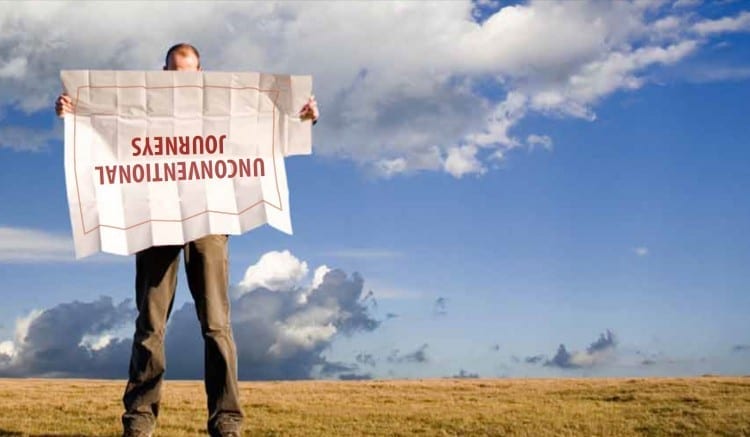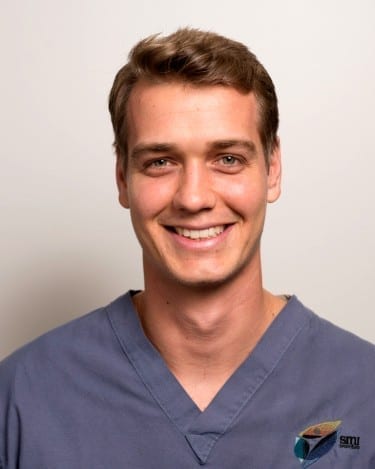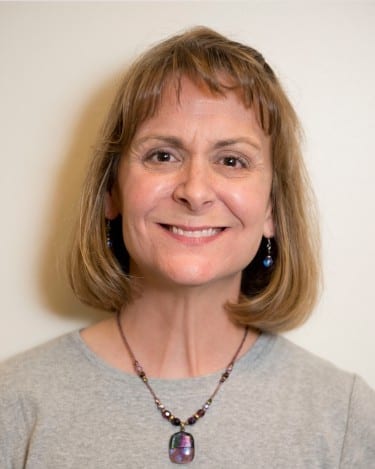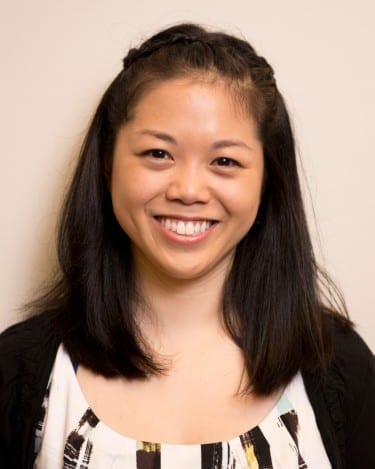In the not-too-distant past, Justin Bergh was bartending in San Diego, and Amber Faherty was patching up soldiers in Afghanistan. Grace Ouyang was working as a bacteriologist with her sights set on dental school. Ben Rezny was busting sex traffickers in Minnesota’s Twin Cities.
Amid their very different experiences, these individuals have a big thing in common: After pursuing various paths in their lives and careers, all are now DMU students. All bring valuable insights to their courses and classmates, and all agree they’ve found the right place at DMU.
“Not a single day goes by that I wish I was doing something else,” says Bryan Stocker, D.O.’16, a former auto mechanic and semi-truck driver. “I love studying. I love learning. I never felt that way in school before.”
According to the American Council on Education, adult learners – typically defined as older than 25 – have comprised close to 40 percent of the college-going population for almost two decades. Medical schools now routinely admit students in their 30s and 40s who already have families or are well into other careers. DMU, where students range in age from 21 to 49, seems to attract an especially diverse bunch.
“I think osteopathic schools attract more nontraditional students, the types of applicants who tend to have different academic backgrounds from those who apply to M.D. schools. These students come with a more holistic view,” says Gina Smith, director of admission for the University’s podiatric, health care administration and public health programs. “We place high value on applicants with strong health care experiences. They bring years of clinical exposure that a college senior doesn’t have.”
They also bring “different world views, maturity and experiences,” says Josh Kvinlaug, director of admission for the physician assistant and physical therapy programs. “There’s a lot of benefit to having them mix with younger students.”
At the same time, the transition from careers to medical/health sciences school has its hardships, Smith and Kvinlaug say. Giving up a paycheck for the intensity of tough classes, arduous exams and long nights of studying can lose its appeal pretty quickly.
“We talk to applicants about how rigorous our programs are,” Kvinlaug says. “Most have families. Add a health sciences curriculum to the kids, the cars and the mortgage, and the pressures can be great.”
Certain aspects of DMU can counter that, from its supportive environment among students and faculty to its location in a relatively affordable, family-friendly city. So can realities of health care, such as the rising demand for primary care and availability of scholarships for those who pursue it. The biggest factor, though, can be the student’s heartfelt life goal.
“Individuals may be established in a career but then find themselves questioning that choice,” Smith says. “They ask themselves what they’re doing and go back to their
original dream of working in health care.”
Amber Faherty: Navy veteran, physician assistant student
Amber Faherty’s parents were dismayed when their 17-year-old daughter joined the Navy. Other than her grandfather’s short stint in the Army, her family had no military tradition.
“I have three sisters and think I’ve always wanted to stick out a little bit,” she says. “I started boot camp on my 18th birthday. It was a little overwhelming. Everyone was screaming and yelling at you.
I got to call home; I told my dad I loved him, then they cut the phones.”
Faherty was stationed as a Navy medic in San Diego with the hospital ship USNS Mercy and eventually was attached with a traveling surgical team. “I was in active duty for five years. During that time I spent one birthday not deployed,” she says. “I deployed with the Navy and Marines and have been around the world twice.”
Faherty gained extensive trauma training in cardiology, family practice, surgery and intensive care. That suited her career interest in health care and gave her great preparation for medical school, but it came with its hardships.
“The hardest experience was having a young soldier, a friend, come in after getting hit by a roadside bomb – Afghanistan, I think; it all blurs together,” she says. “I got his dog tags to check his blood type. His little girl’s picture was on it. He’d never seen her, and she’ll never meet him.
“You get used to knowing who is going to make it and who is not,” she adds. “I had trouble adjusting to the civilian world. I still have nightmares.”
Still, Faherty says joining the military, “hands down, was the best thing I ever did.”
“It made me a better person overall. I always think I need to do more to help and serve others,” she adds. “I treasure the relationships I built. People in the military would take a bullet for you.”
Now thinking of returning to the military in the Army or Air Force Guard – “I can’t get away from it,” she says – Faherty anticipates practicing in emergency medicine. In whatever she does, she upholds her appreciation and support of those who are and have been deployed. As a DMU physician assistant student, she helped organize regular shipments of care packages to soldiers.
“The thing that’s most important to me is not to forget. Even sending a care package reminds the
deployed there is a home,” she says. “Veterans need fellow veterans who understand what they’ve gone through. Having a safe place is more important than people think.”
Justin Bergh: tending bar, buying time
Born and raised on the Hawaiian island Oahu, Justin Bergh majored in computer science at the University of Hawaii for three years. He then realized there was “no way” he wanted that as his career.
He moved to San Diego and got a job bartending while figuring out his next step. One day he spotted a customer with several sheets of paper spread on the bar in front of her. When he joked “it’s time to put the homework away,” she explained it was the roster for her dodgeball team, which she invited him to join.
“I thought why not – I’d just moved to San Diego and didn’t know many people,” Bergh says.
It just so happened one member of the team was Damion Valletta, D.O.’89, a board-certified orthopedic surgeon, founder of Valletta Orthopaedics and physician for the Olympic gold-medal-winning U.S. Women’s National Soccer Team. Valletta invited Bergh to shadow him for a day.
“He’s a smart guy who was underutilizing his potential. He could communicate and deal with all different kinds of people, and he has a great work ethic,” Valletta says.
While Bergh had grown up “seeing medicine” thanks to his mother’s career as a pediatric nurse practitioner, he “almost passed out” while observing his first surgery at Valletta’s practice. “I didn’t know how to separate the human component from the surgical procedure,” he says.
Bergh learned to make that distinction and went on to observe hundreds of surgeries. He shadowed Valletta and completed medical prerequisites as a philosophy major at the University of San Diego. Last year, he worked as a paid intern, checking in new patients and taking histories.
He also organized the practice’s educational programs for the community. “He was logistically able to organize a lot of things for the practice,” Valletta says.
Bergh volunteered in a San Diego emergency room, applying skills he’d honed as a bartender.
“I gravitated toward cases no one else wanted to touch. For example, the drunk guy who came in restrained and wearing a spit mask. Within 20 minutes, he was hugging me. I just talked to him like I normally would.”
Now a first-year student in DMU’s osteopathic medical program, Bergh has “the fundamental requirements to be a good physician,” Valletta says. “You’ve got to be a good communicator with a lot of different people, and Justin has that intuitively. He’s going to be great – he’s passionate and has the desire to learn and to help others.”
Ben Rezny: crime fighter turned future physician
President of his class at DMU, Ben Rezny, D.O.’16, spent part of his summer as a resident assistant for a group of undergraduates in a University medical mentorship program. He sat in a dunk tank during “D.O. Palooza,” an event that kicked off the fall term. He’s active in DMU’s Multicultural Affairs Student Advisory Committee, which promotes cultural competence and understanding among future health care professionals.
In other words, Rezny is one of the nicest guys you’ll ever meet, especially considering he experienced some of the darkest sides of humanity during his 12 years in law enforcement. Starting as a park ranger and parking attendant in Minnesota’s Twin Cities, he worked for the police force as a school resource officer and detective, responding to emergency calls and investigating crimes against people and property. He then worked on a federal task force investigating human sex trafficking and Internet crimes against children.
“To use a medical term, it’s highly under-diagnosed,” he says. “It’s anywhere you have at-risk youth, runaways who get invited to meet a pimp and then get trapped.”
It’s a dangerous and tragic turn. “Pimps will trick juveniles into it, then dope them up on drugs and alcohol,” he says. “The pimps dress them, feed them and control everything. It becomes comfortable for the victim.”
When being trafficked becomes that ingrained, Rezny says, it’s critical to get the victim locked in a safe place. “’Secure’ is the big thing. Being trafficked is the life they know,” he says. “Some are proud they turned five tricks in a night.”
Rezny notes that trafficked juveniles are often abused at home and “aren’t the easiest people to deal with,” but he emphasizes they are victims.
“They’re rough and tough, but they are victims,” he says. “The very first juvenile prostitution case I had, they were booking her into juvenile detention. Treating these juveniles as victims versus criminals has been a big shift in the thinking and approach to the problem.”
Tackling this ugly crime, he says, requires “interagency cooperation” among law enforcement, the legal system, social workers, schools and health care. It also requires the patient cultivation of trust with the victims.
“You have to come through if you make a promise. I’d give them my cell phone number so they could call me day or night,” he says.
Rezny’s long-term goal always was to become a physician, even though it meant leaving law enforcement at the height of his career. “I was getting press exposure, handling huge cases and getting big confessions,” he says. “But my last couple of years, I had three partners killed.”
Rezny knows his past experiences will hone his abilities as a doctor. “As a police officer, I was hyper-vigilant. I say it’s the cop hairs going up on the back of my neck,” he says. “You learn to ask questions: ‘Really? Tell me about that; I want to understand your story.’ You can’t come across as judgmental.”
He plans to help his future patients where they are in life. “You have to work with them on their problems. If they’re having sex, help them understand how to have safe sex and the long-term effects on their health.”
He jokes that he sometimes “misses the adrenaline” of his previous life.
“Studying biochemistry just isn’t the same as knocking someone’s door in,” he laughs, then sobers: “But my adrenaline is spent at this point.”
Barbara Merriman: from big oil to health care
Barbara Merriman became interested in engineering in high school, where her favorite subjects were mathematics and chemistry and she “saw a lot of information that the job market in engineering would be really good.”
The chemical engineering major at Michigan Technological University was right: Smart, hardworking and female, Merriman was a catch in an industry where the ratio of men to women was
eight to one. She interviewed with paper and oil companies, the latter of which were offering the highest salaries.
“When you’re coming out of undergraduate, you see the dollar signs and think, ‘Yeah, that’s the way to go,’” she says. She joined Mobil in Joliet, IL, and worked there for more than 11 years. She met her husband, Charlie, there and loved the highly detailed analysis that engineering demands.
The company’s merger with Exxon in 1999 opened “all kinds of jobs,” including at a refinery in Billings, MT. With their sense of adventure and no children to relocate, she and Charlie made the move in 2000.
ExxonMobil is the world’s largest publicly traded international oil and gas company with facilities and markets around the globe.
Despite her success, the operations/process engineer and then refinery asphalt coordinator found herself staring down the years to her retirement and questioning whether she was in the right place.
“I would sit at my desk the entire day, running all these computer models, spreadsheets and projections. That’s not what I was meant to do,” she says. “It made me feel like I was dying a slow death.”
Still, Merriman “formed a real camaraderie” with the other engineers. “I really got so attached to the people. That was one of the things that in the end drew me to medicine,” she says. She contemplated how she could focus her razor-sharp analytical understanding of the complex processes of oil production to the human body.
“As an engineer, I had to know down to the molecular level everything that goes on in the refining process. I love learning about and understanding human physiology at the molecular level,” she says. “My interest in medicine was not so much altruistic, but how I could apply my God-given skills to how the human body works.”
While Merriman was jazzed about medicine, leaving her established career was a big leap.
“I was numb the whole day; even I couldn’t believe I was doing this,” she says. “When word got out, people kept coming up to me to ask, ‘Why are you doing this?’ – especially since I didn’t have another job at that point.”
In 2005, Merriman became a nurse’s aide in a nursing home and then in an inpatient unit at a local hospital. She began her pre-medical courses at Montana State University and also tutored students in biology and chemistry.
“I love to teach,” she says. “I think that’s part of what I’ll love about being a doctor. Patient education is 50 percent of the battle.”
With her near-perfect grade point average in her pre-med courses, her professors advised her to become a physician rather than a nurse. She applied at DMU.
“DMU was a very easy decision. I felt so welcomed there,” she says. “I felt I could relate more to the D.O. approach, with its very comprehensive thinking and looking at the body mechanically.”
Merriman, who graduated from DMU’s osteopathic medical program in May, is now in a four-year neurology residency in Erie, PA, her first choice. Reflecting on her journey, she says walking away from big oil was “terrifying” but the “right thing to do.”
“As a doctor, I’m seeing patients all day long, talking with them and with colleagues. I’m so in my element the entire time,” she says. “This is what I was meant to do.”
Grace Ouyang: dentist-wannabe turned podiatric student
Grace Ouyang has worn several hats in her life. A violinist since age five, she began her undergraduate years as a violin performance major at Lawrence University. She has performed with the Fort Dodge, IA, Symphony; the Ames, IA, Civic Orchestra; and the DMU Chamber Orchestra, which she served as president. She continues to tutor students on the instrument.
Ouyang also worked for several years as a bacteriologist in an Ames veterinary diagnostics lab, with her long-term sights set on dentistry. She was interested in dentistry in part because of her two years’ volunteering at a free dental clinic.
“I’ve worked with a lot of kids and know what it’s like to be an awkward teenager,” she says. “I know what it’s like having braces and seeing kids when they get their braces off. Even while I was shadowing, they’d hug me afterward. It’s great being around people who are so grateful.”
One of her colleagues at the veterinary diagnostics lab, Linda Terry, offered up her husband, Wayne, to give her tips on interviewing for dental school. He was then professor of physiology and pharmacology at DMU.
“We met at a restaurant in Ames. I asked her, ‘What is it about dentistry? Ever think about physician assistant or podiatry?’” recalls Wayne Terry, now professor emeritus after retiring June 30 after nearly 35 years at the University. “I said she should come down to DMU to meet our podiatric faculty and dean. I told her I was sure I could get her in to shadow some folks.”
After three years of being “badgered” by Terry, she relented and shadowed six students in DMU’s College of Podiatric Medicine and Surgery (CPMS). Four of the six previously were dental students, which she took as a good sign. Then she shadowed CPMS faculty in the Foot and Ankle clinic, including John Bennett, D.P.M., FACFAS.
“The first patient he had had made extra cherry pies for the state fair and brought one in for him,” she recalls. “I thought, ‘This is fantastic – you become a podiatrist, you get offered cherry pie. I can do this.’”
It also happened that her husband Jared’s father is a podiatrist, so she shadowed him as well.
Pumped about the profession, Ouyang still wondered: Could she make it in medical school? It had been six years, after all, since she had completed her undergraduate degree. She applied some of her musical lessons to medical school.
“When I learn music, I use flashcards. Here, I turn class PowerPoint presentations into flashcards,” she says. “I’m very auditory, so I listen to lectures often more than once. I’m here with a focus. I’m here to work.”
Now a third-year CPMS student, Ouyang also volunteers. For a DMU pilot project, she is among those who take free blood pressure readings at barbershops and churches in central Iowa’s African American community. “It’s really fun to interact with people in the community,” she says.
A delegate for the Student National Podiatric Medical Association (SNPMA), Ouyang also enjoyed attending the Midwest Podiatry Conference in April.
“I was able to follow along and appreciate all I’ve learned the last two years,” she says. “We’re getting a really good education here. To know someday I’ll be able to use what I’m learning is very exciting.”







